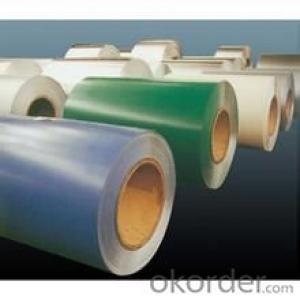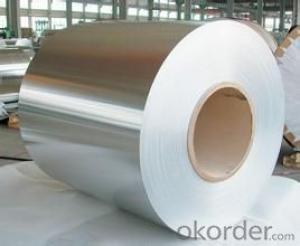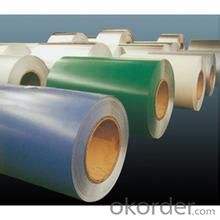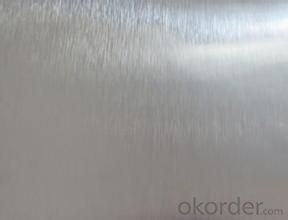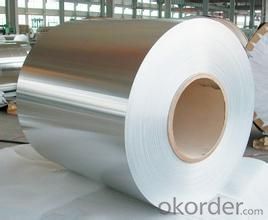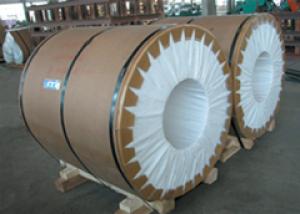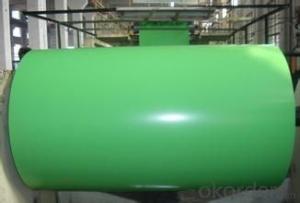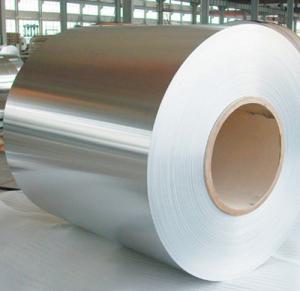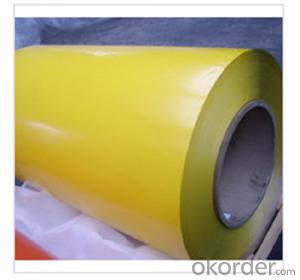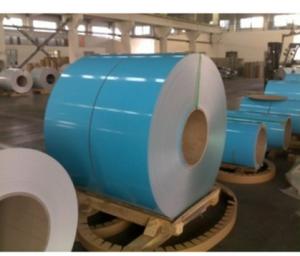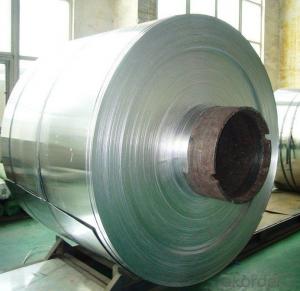Brushed Aluminum Coil - Smooth Surface Alu-Coil
- Loading Port:
- China Main Port
- Payment Terms:
- TT OR LC
- Min Order Qty:
- -
- Supply Capability:
- -
OKorder Service Pledge
OKorder Financial Service
You Might Also Like
Aluminium is a relatively soft, durable, lightweight, ductileand malleablemetalwith appearance ranging from silvery to dull gray, depending on the surfaceroughness. It is nonmagnetic and does not easily ignite. A fresh film ofaluminium serves as a good reflector (approximately 92%) of visible lightand an excellent reflector (as much as 98%) of medium and far infraredradiation. The yield strength of pure aluminium is 7–11 MPa,while aluminium alloys have yield strengths ranging from200 MPa to 600 MPa. Aluminium has about one-third the densityand stiffness of steel. It is easily machined,cast, drawn and extruded.
Aluminium alloys (or aluminum alloys; see spellingdifferences) are alloysin which aluminium(Al) is the predominant metal. The typical alloying elements are copper, magnesium,manganese,silicon,tin and zinc. There are twoprincipal classifications, namely casting alloys and wrought alloys, both of which are furthersubdivided into the categories heat-treatableand non-heat-treatable. About 85% of aluminium is used for wrought products,for example rolled plate, foils and extrusions.Cast aluminium alloys yield cost-effective products due to the low meltingpoint, although they generally have lower tensile strengthsthan wrought alloys. The most important cast aluminium alloy system is Al–Si,where the high levels of silicon (4.0–13%) contribute to give good castingcharacteristics. Aluminium alloys are widely used in engineering structures andcomponents where light weight or corrosion resistance is required
Specification:
Alloy: AA1050, 1060, 1100,AA3003, 3005, 3015, 5052, 5754, 5083,8011, etc
Temper: H14/16/18/22/24/32,HO etc.
Thickness: 0.2mm—100mm
Width: 100mm—2300mm (Can be slitted)
Inner Diameter:508MM
Coil Weight:500kg-3000kg(Max.)
Application:Foil stock, Circles, Roofing, Can stock, Marine plate,Anti-slipery purpose in vehicles, packing and appliance.
Features:
1. Excellent quality of products
2. Quick delivery
3. Best service to clients
4. BV,SGS avalible
5. No buckle o waveness
6. Tension leveling
7. Certificate of Origin
8. Form A,E
Packaging Detail:
Carton ,Woodenpallet with plastic protection packing ,standard seaworthy packing or as yourrequest.
Production Capacity:
AnnualProduction capacity of 600,000 tons.
Products areexported to United States, Canada, U.A.E, Brazil, Mexico,Thailand, Vietnam,Nigeria etc, over 100 countries andregions all over the world.
Production Line:
CNBM aluminumproduction base is comprised of 18 aluminumannealers, 10 coil and foilmills, 4 continuous production lines, 2hot rolling production line and 3prepainted lines.
FAQ:
1. What is the form of payment?
Normally 30% TT, L/C
2. Type of quotation?
FOB, CFR, CIF
3. Port of loading?
Shanghai port
4. Delivery time?
30 days after client’s deposit
- Q: I am wondering if a deodorant made with aluminum silicate is safer than one with aluminum salt.
- aluminum silicates have been used in deodorants for years. there was a time when it was thought that the Al in the deodorants was causing alzheimers but that has been shown to be wrong. if there are other dangers to the silicates, we haven't found them or they aren't that bad
- Q: This question asks for guidelines on how to properly store aluminum coils to ensure their safety and longevity.
- <p>To store aluminum coils, follow these steps: Ensure the storage area is clean, dry, and free from dust and moisture. Keep the coils on wooden pallets or racks to avoid direct contact with the ground. Stack the coils with the same size and type to prevent damage. Use protective wrapping or covers to prevent scratches and dirt accumulation. Maintain proper ventilation to prevent condensation. Store coils away from corrosive materials and chemicals. Regularly inspect the coils for any signs of damage or corrosion. By following these guidelines, you can maintain the quality and integrity of aluminum coils during storage.</p>
- Q: What precautions should be taken to ensure the safe and efficient transportation of aluminum coils?
- <p>The best way to handle aluminum coil during transportation involves using proper lifting equipment, ensuring secure strapping, and maintaining a stable and dry environment. Use slings or lifting beams specifically designed for metal coils to prevent damage. Ensure the coil is strapped tightly to prevent shifting during transit. Keep the coils covered to protect from moisture and dirt. Always follow the manufacturer's guidelines for weight limits and handling procedures.</p>
- Q: Are aluminum coils suitable for curtain wall systems?
- Yes, aluminum coils are suitable for curtain wall systems. Aluminum is a popular material choice for curtain walls due to its strength, lightweight nature, and corrosion resistance. Aluminum coils provide flexibility in design, ease of installation, and durability, making them an ideal choice for curtain wall systems.
- Q: This question asks for a comparison of various types of insulation materials, highlighting their unique characteristics and differences.
- <p>Different types of insulation materials vary in their properties such as thermal resistance (R-value), fire resistance, moisture resistance, and environmental impact. Fiberglass is a common, cost-effective option with good thermal resistance but can be irritating to the skin and respiratory system. Cellulose insulation is made from recycled paper and has good sound absorption but may be less fire resistant. Foam insulation like spray foam offers excellent insulation and air sealing but can be more expensive and harder to install. Mineral wool is fire-resistant and durable but may be less thermally efficient. Each type has its advantages and drawbacks, and the choice depends on factors like cost, environmental impact, and specific insulation needs.</p>
- Q: I have been trying to make some thermite for a while now, and I haven't had much success. I have tried using iron oxide and that didn't work. then I tried using manganese dioxide, also without success. I'm pretty sure I have the right proportions for each of the corresponding oxides, but it just isn't working. I am using magnesium ribbon to light it.The aluminum I am using is the byproduct of me trying to cut a block of aluminum with a hacksaw (best way I have available to cut it) and there is a lot of aluminum powder that is being made. But i'm not sure if it is fine enough to be effective. I don't have an etch-a -sketch so that's not an option. I know that it has to be fairly fine grained, but how small do the particles need to be?FOR EVERYONE WHO IS GOING TO TRY AND TELL ME THAT MAKING THERMITE IS DANGEROUS OR SOMETHING ALONG THOSE LINES......DONT!!!!!!!!.......... IM NOT GOING TO LISTEN SO SAVE YOURSELF THE TYPING AND ME THE READING
- In 35+ years of demonstrating the thermite reaction, I have used fine aluminium powder to quite visible small bits. The proportions don't seem too critical, but try and keep near the amounts represented by the balanced eqtn. The difficult bit is getting the wretched stuff to ignite. With some mixes several strands of magnesium ribbon as fuse still wouldn't get it to ignite. I found a pile of 'ignition powder' at the base of the Mg often helped. There was a good commercial one available in the UK but I often made one up, main ingredients barium peroxide and magnesium powder, about 50/50. Needless to say, ignite with this mix where you won't breathe any nasty fumes. To get a good result, if I didn't use a proper crucible, I shaped one of Al foil about the capacity of 2-3 eggcups. This was put on sand in a big coffee tin, then more sand added to fill round the sides. This would give a good amount of iron. I once made the mistake of rushing in too quickly to get out the red hot iron.... and completely melted the ends of a large pair of Nickel tongs!
- Q: My budgies took at bath in an aluminum pie tin today. At first they bit it just because it was their first time. Should I be worried that they might get poisoned?
- Nah, when I was a baby I took baths in aluminum pie tins all the time.
- Q: who discovered aluminum and in what year did they discover it?
- They didnt discover it they created it its an alloy! Charles Martin Hall invented the aluminum manufacturing process Although aluminum is the most abundant metal in the earth's crust, it is never found free in nature. All of the earth's aluminum has combined with other elements to form compounds. Two of the most common compounds are alum, such as potassium aluminum sulfate (KAl(SO4)2·12H2O), and aluminum oxide (Al2O3). About 8.2% of the earth's crust is composed of aluminum. Scientists suspected than an unknown metal existed in alum as early as 1787, but they did not have a way to extract it until 1825. Hans Christian Oersted, a Danish chemist, was the first to produce tiny amounts of aluminum. Two years later, Friedrich W?hler, a German chemist, developed a different way to obtain aluminum. By 1845, he was able to produce samples large enough to determine some of aluminum's basic properties. W?hler's method was improved in 1854 by Henri ?tienne Sainte-Claire Deville, a French chemist. Deville's process allowed for the commercial production of aluminum. As a result, the price of aluminum dropped from around $1200 per kilogram in 1852 to around $40 per kilogram in 1859. Unfortunately, aluminum remained too expensive to be widely used.
- Q: I heard that one pound of aluminum pop tabs are worth more then a pound of aluminum pop cans. Is this true? Thank you.
- I Think So Because clean aluminum is easier to handle because they don't have to wash it like unclean aluminum.
- Q: This question asks for criteria or methods to determine if an aluminum coil is of high quality.
- <p>To identify a good quality aluminum coil, consider the following factors: purity indicated by the alloy number, surface finish which should be smooth and free from defects, thickness consistency, and mechanical properties such as tensile strength and elongation. Check for certifications or quality standards compliance. Look for uniform color and absence of oil stains or rust. The coil should have precise dimensions and be free from dents or scratches. Additionally, consider the supplier's reputation and customer reviews.</p>
Send your message to us
Brushed Aluminum Coil - Smooth Surface Alu-Coil
- Loading Port:
- China Main Port
- Payment Terms:
- TT OR LC
- Min Order Qty:
- -
- Supply Capability:
- -
OKorder Service Pledge
OKorder Financial Service
Similar products
Hot products
Hot Searches
Related keywords
